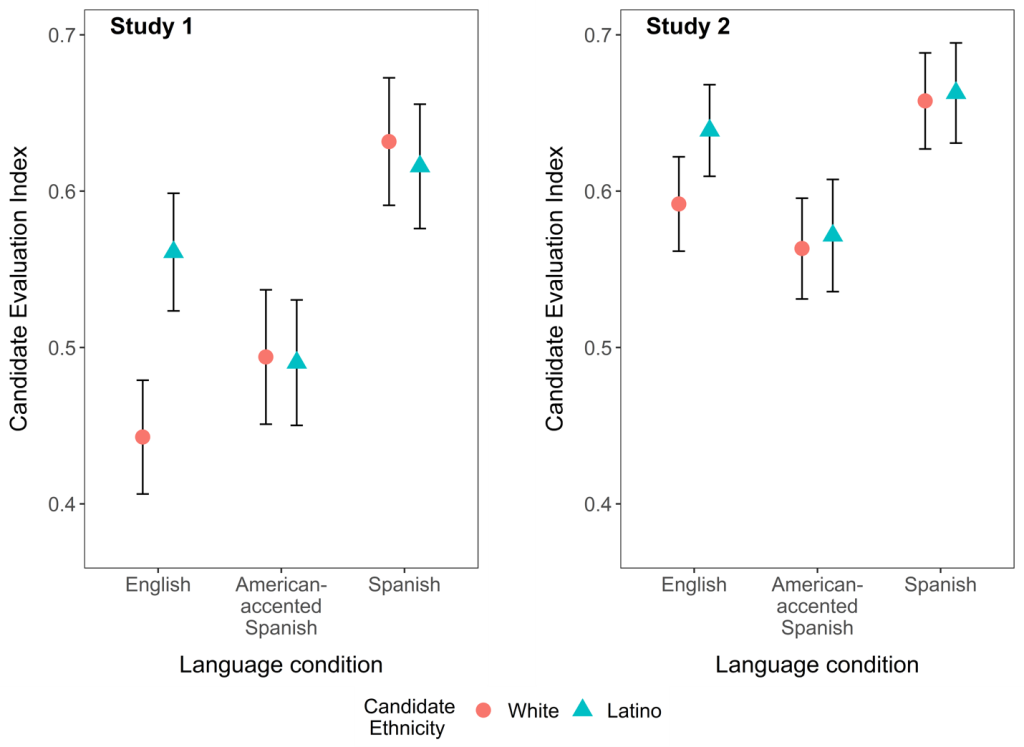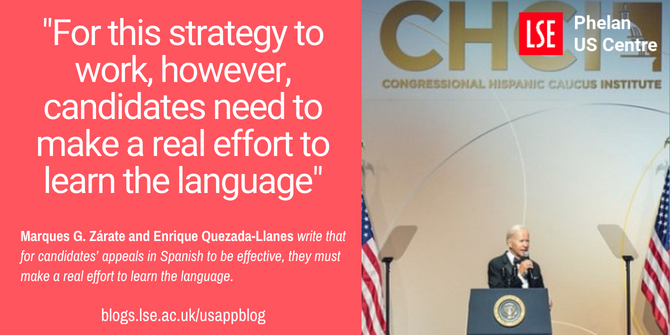
 The past 15 years has seen a rise in the number of US political candidates creating Spanish-language advertisements, and speaking Spanish as part of their campaign events, often prompting some in the media to accuse them of ‘Hispandering’. In new research, Marques G. Zárate and Enrique Quezada-Llanes examine how Spanish-language appeals by candidates are received by Latino voters. They find that Latinos had more favorable views of both white and Latino candidates who spoke Spanish with a native-like accent compared to those who only spoke in English. If candidates speak the language well, they write, Latinos do not punish white candidates for speaking Spanish on the campaign trail.
The past 15 years has seen a rise in the number of US political candidates creating Spanish-language advertisements, and speaking Spanish as part of their campaign events, often prompting some in the media to accuse them of ‘Hispandering’. In new research, Marques G. Zárate and Enrique Quezada-Llanes examine how Spanish-language appeals by candidates are received by Latino voters. They find that Latinos had more favorable views of both white and Latino candidates who spoke Spanish with a native-like accent compared to those who only spoke in English. If candidates speak the language well, they write, Latinos do not punish white candidates for speaking Spanish on the campaign trail.
In the November 2022 midterm elections, Latinos were projected to make up 14.3 percent of all eligible voters, nearly double the 7.4 percent share the group had in 2000. As the number of eligible Latino voters has increased, so too have the efforts of politicians to mobilize this group. For example, in the 2022 race for Texas Governor, a state with 4.4 million Spanish-speaking voters, the Democratic and Republican candidates, Beto O’Rourke and Greg Abbott, spent a combined $8 million on Spanish advertisements and outreach. When on the campaign trail, one strategy politicians use to try and appeal to Latino voters is by speaking Spanish. These appeals are delivered by Latino and non-Latino candidates with varying proficiency levels. Although speaking Spanish while campaigning may seem like a good way to connect with Latinos, in new research, we find that this campaign strategy helps some candidates but can also hurt others, depending on the accent they speak the language in.
When political candidates speak Spanish to voters, particularly when the candidate is not Latino themselves, they are often labeled by pundits and the media as “Hispandering” or that they are making an insincere gesture toward Latinos. It is unclear, however, whether Latinos perceive appeals made in Spanish to be Hispandering. We argue that given the United States’ history of discrimination toward those who speak Spanish, hearing a public figure speak Spanish, even if done with an American accent, will be seen as a positive signal that the candidate wants to represent Latino voters.
How do Latino voters react to appeals made in Spanish?
To study Latino reactions to Spanish-language appeals, we recruited about 1,500 Americans who identify as Latino to participate in two survey experiments. We asked participants to listen to a short audio clip we produced of a hypothetical candidate giving a part of their stump speech. We told participants the candidate was either white or Latino and edited the audio clip so that the candidate either spoke entirely in English, partially in American-accented Spanish, or partially in native-accented Spanish. This experimental set-up allowed us to see if reactions to Spanish-language appeals differ depending on the ethnicity of the candidate and the proficiency with which the candidate speaks Spanish. Figure 1 shows our results.
Figure 1 – Average candidate favorability for each study group

Note: Candidate evaluation index ranges from 0-1 with higher values indicating more favorable evaluations. The bars are 95 percent confidence intervals.
Across the two experiments, we found that Latinos had more favorable views of candidates who spoke Spanish with a native-like accent compared to candidates who only spoke in English. This was true for both the Latino and white candidates, indicating that white candidates who speak Spanish well are not viewed as Hispandering by Latinos. In fact, in both survey experiments, when the white candidate spoke Spanish well, they were evaluated similarly to a Latino candidate who spoke Spanish well. These findings suggest that Latinos do not punish white candidates for speaking Spanish on the campaign trail if they do so well.

“P20220915AS-2797” by The White House is United States government work.
How much does candidates’ Spanish proficiency matter?
Since many candidates, both Latino and non-Latino, speak Spanish with an American-like accent, we investigate whether language proficiency matters. When evaluating a Latino candidate, speaking Spanish with an American accent was perceived negatively compared to when the candidate only speaks in English. We argue this is because it signals to Latinos that the Latino candidate is perhaps removed from their Latino heritage. The reason why Spanish appeals may work is that the Spanish language is culturally important to many Latinos. A large majority of Latinos think it is important that future generations of Latinos speak Spanish. A Latino candidate speaking Spanish without a native-like accent signals that they likely did not grow up learning Spanish.
In contrast to perceptions of the Latino candidate, perceptions of the white candidate either remained the same or became more favorable when speaking Spanish with the same American accent as when the candidate only used English. In the first study, compared to a white candidate who only spoke in English a white candidate speaking Spanish with an American-like accent was viewed more favorably. Although we do not see this same effect in the second experiment, this finding suggests white candidates who perhaps are just learning Spanish can still improve their evaluation among Latino voters.
More candidates are using Spanish in their campaigns
In addition to our survey experiments, we used House of Representative campaign advertisement data collected by the Wesleyan Media Project to investigate if the number of candidates who use Spanish in their campaigns has changed over time. Between 2010 and 2018, 151 candidates created a Spanish advertisement with a total of 407 Spanish campaign advertisements created over this same period. In 2010, 40 unique Spanish advertisements were created. In 2018, this number jumped to 137 unique Spanish advertisements created. This shows how more candidates are devoting resources to mobilizing Latino voters.
As more Latinos enter the American electorate, candidates are moving away from traditional campaign strategies by incorporating campaign advertisements in Spanish or by speaking Spanish in public settings. Our results suggest that reaching out to Latinos in Spanish can be an effective strategy for candidates who wish to be viewed more positively. For this strategy to work, however, candidates need to make a real effort to learn the language. As the voting advocacy organization, Voto Latino, put it, politicians will not get by solely with “feeble attempts to speak in Spanish.”
- This article is based on the paper, ‘Se Habla Español: Spanish-Language Appeals and Candidate Evaluations in the United States’, in American Political Science Review.
- The replication data for this study.
- Please read our comments policy before commenting.
- Note: This article gives the views of the author, and not the position of USAPP – American Politics and Policy, nor the London School of Economics.
- Shortened URL for this post: https://bit.ly/3pqP8k8






